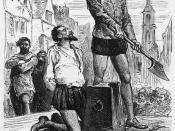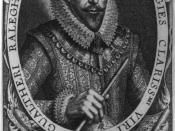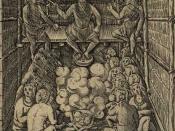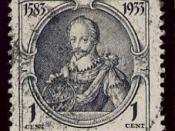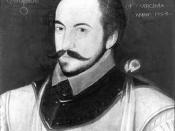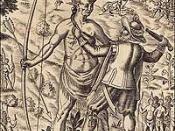The European history of Virginia began in 1570 with a short-lived Spanish mission probably located on the York River. In 1584, Sir Humphrey Gilbert obtained a grant from Queen Elizabeth to colonize all of North America not occuppied by the Spanish or French. The first expedition to the vast new territory, named Virginia in honor of the queen, was sent out the same year by Sir Walter Raleigh and arrived at Roanoke Island in 1585. More settlers came two years later, but by 1591--their supplies having been interrupted by England's war with Spain--all the colonists had died or disappeared.
After a few other false starts, on December 20, 1606, the London Company, established by Shakespeare's patron, Henry Wriothesley, third earl of Southampton, sent out three ships--Susan Constant, Discovery, and Goodspeed--carrying 143 adventurers, most of them, according to the 18th Century Virginia writer William Byrd, "reprobates good families." The ships landed on April 26, 1607, and the settlement of Jamestown, named in honor of the king, was established May 14, 1607.
Early Trials: The colony, the first permanent English settlment in the New World, suffered from poor leadership, famine, disease, disputes with the Indians, and failure to find a marketable product.
Captain John Smith returned to England in 1609, and conditions grew so severe during the following winter that the colonists decided to abandon their settlment. As they set sail in June of 1610, Lord De La Warr arrived with reinforcements and supplies.
In 1614, John Rolfe who introduced tabacco to Virginia, married Pocahontas, daughter of the chief Powhatan, a union that led to a period of peace with the Indians. Under the leadership of Sir Thomas Dale and Sir George Yeardley, De La Warr's successors as governor, the colony began to prosper. The House of Burgesses was found in 1619; that same year saw the importation of the first slaves to labor in the tobacco fields. In 1622, a new chief, Opechancanough, Powhatan's successor, organized a sudden attack that left 347 settlers--more than one-third of the whites--dead.
